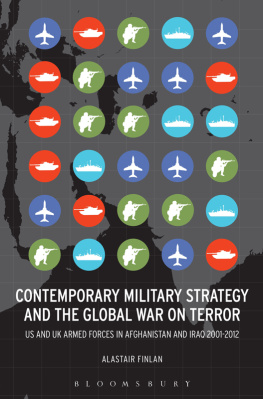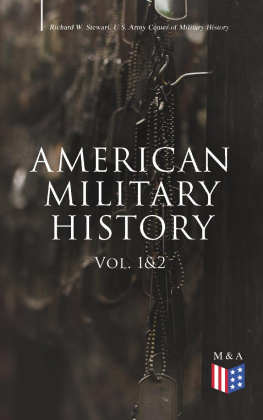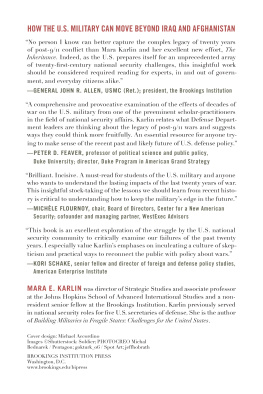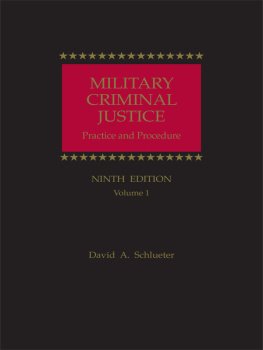THE PURITAN CULTURE OF AMERICAS MILITARY
Classical and Contemporary Social Theory
Series Editor: Stjepan G. Mestrovic, Texas A&M University, USA
Classical and Contemporary social Theory publishes rigorous scholarly work that re-discovers the relevance of social theory for contemporary times, demonstrating the enduring importance of theory for modern social issues. The series covers social theory in a broad sense, inviting contributions on both classical and modern theory, thus encompassing sociology, without being confined to a single discipline. As such, work from across the social sciences is welcome, provided that volumes address the social context of particular issues, subjects, or figures and offer new understandings of social reality and the contribution of a theorist or school to our understanding of it. The series considers significant new appraisals of established thinkers or schools, comparative works or contributions that discuss a particular social issue or phenomenon in relation to the work of specific theorists or theoretical approaches. Contributions are welcome that assess broad strands of thought within certain schools or across the work of a number of thinkers, but always with an eye toward contributing to contemporary understandings of social issues and contexts.
Also in the series
A Genealogy of Social Violence
Founding Murder, Rawlsian Fairness, and the Future of the Family
Clint Jones
ISBN 978-1-4724-1722-0
Liquid Sociology
Metaphor in Zygmunt Baumans Analysis of Modernity
Edited by Mark Davis
ISBN 978-1-4094-3887-8
Violence, Society and Radical Theory
Bataille, Baudrillard and Contemporary Society
William Pawlett
ISBN 978-1-4094-5542-4
The Puritan Culture of Americas Military
U.S. Army War Crimes in Iraq and Afghanistan
RONALD LORENZO
Blinn College, USA
First published 2014 by Ashgate Publishing
Published 2016 by Routledge
2 Park Square, Milton Park, Abingdon, Oxon OX14 4RN
711 Third Avenue, New York, NY 10017, USA
Routledge is an imprint of the Taylor & Francis Group, an informa business
Copyright Ronald Lorenzo 2014
Ronald Lorenzo has asserted his right under the Copyright, Designs and Patents Act, 1988, to be identifed as the author of this work.
All rights reserved. No part of this book may be reprinted or reproduced or utilised in any form or by any electronic, mechanical, or other means, now known or hereafter invented, including photocopying and recording, or in any information storage or retrieval system, without permission in writing from the publishers.
Notice:
Product or corporate names may be trademarks or registered trademarks, and are used only for identification and explanation without intent to infringe.
British Library Cataloguing in Publication Data
A catalogue record for this book is available from the British Library
The Library of Congress has cataloged the printed edition as follows:
Lorenzo, Ronald.
The Puritan culture of Americas military : U.S. Army war crimes in Iraq and Afghanistan / by Ronald Lorenzo.
pages cm.(Classical and contemporary social theory)
Includes bibliographical references and index.
ISBN 978-1-4724-1982-8 (hardback)1. Sociology, MilitaryUnited States. 2. Courts-martial and courts of inquiryUnited States. 3. PuritansInfluence. 4. Iraq War, 2003-2011 Atrocities. 5. Afghan War, 2001Atrocities. 6. Military offensesUnited States. 7. War crimesCase studies. I. Title. II. Title: US Army war crimes in Iraq and Afghanistan.
U21.5.L65 2013
306.270973dc23
2013020858
ISBN 9781472419828 (hbk)
Contents
List of Figures and Tables
Figures
Tables
To my parents, Mary and Roger Lorenzo,
and in memory of my best friend,
Jason Charles Crawford (July 19, 1971January 2, 2009).
Preface
Exploring Puritanical cultural habits in the 21st century American military, the following study focuses on U.S. Army courts-martial in the Global War on Terror. The study uses Emile Durkheims original sociological interpretation of crime and deviance. That interpretation is linked with responsibility as described by Durkheims follower Paul Fauconnet in Responsibility: A Study in Sociology ([1928] 1978) and with a new cultural reading of Max Webers The Protestant Ethic and the Spirit of Capitalism ([1905] 1976). The study is an inductive, descriptive examination of the Puritanical aspects of American military culture based on its treatment of acts labeled as deviant and criminal in the Global War on Terror. Four sets of war crimes are examined: Abu Ghraib (which occurred in Iraq in 2004), Operation Iron Triangle (which occurred in Iraq in 2006), the Baghdad canal killings (which occurred in Iraq in 2007), and another set of killings which occurred in Afghanistan. My data include primary data collected through participation and observation for one court-martial related to the Baghdad canal killings as well as secondary data sources from the other cases including records of trial, investigation reports, charge sheets, sworn statements, and other documentation.
The study illuminates how unconscious, Puritan cultural habits color and shape both military actions and their perceptions. I explore Puritanism and its influence on military law, responsibility, revenge, magic (in its sociological sense), and narcissism. The study concludes with observations and recommendations for changes in U.S. military law.
With regard to legal issues regarding my use of court documents, the reader should be aware of the following: all material pertaining to the records of trial from which I quote are regarded by law as public documents. The records of trial (ROT) include the transcripts of Article 32 hearings, other pre-trial hearings, investigative reports, sworn statements, transcripts of testimony at courts-martial, and other documents. The only exception to this rule is the AR 15-6 report case in Afghanistan, which was not included in Corporal Jeremy Morlocks ROT. However, I obtained the Maywand case AR 15-6 report from a news source, and various news sources have already quoted extensively from this report in numerous news reports. Because that specific AR 15-6 report was obtained from a news source, it is also a public document. In summary, all my usage of government documents in this study is lawful, and the government of the United States does not own any copyright to any of this public information.
I wish to make it unequivocally clear that I do not assert or imply any criminal wrongdoing by any officer or soldier whom I mention or quote in this book. I present many instances of wrongdoing and questionable actions neutrally, and as a sociologist, not as a criminal investigator.
Series Editors Preface
Max Weber has been interpreted and applied in seemingly countless scholarly articles and books. The overwhelming majority of this intellectual output focuses on the theme of rationality. The most notable and best-selling example is George Ritzers McDonaldization of Society wherein he links the Weberian tradition to present-day, Western, cultural obsessions with rationality, efficiency, predictability, and control. Ronald Lorenzos book examines lacunae in this Weberian tradition of scholarship. First, he connects Webers insights less to rationality and more to the obvious theme of Puritanism, and how shades of Puritanism as a cultural phenomenon persist. Second, he connects what I would call postemotional Puritanism (because it no longer carries the same authentic, emotional energy today as it did in the days of Oliver Cromwell and John Winthrop) to war and the military justice system. Third, the new areas for analysis that Lorenzo uncovers in applying his reading of Weber in this manner include the themes of revenge, magic and superstition, ritualism, and the treatment of the enemy as well as soldiers who are convicted in the court-martial system as if they were the Puritan damned (as opposed to the Elect). Lorenzo brings to the forefront of analysis much of what is irrational, inefficient, unpredictable, and seemingly out of control in Puritan-based cultures in general, and more specifically with regard to war and justice.










